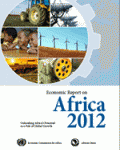Since its establishment in 1959, the Economic Commission for Africa Library connected (advanced) administrative and research information needs of the Commission and the region. Engaging users through discovery, digital collections, and specialized research support, ECA Library delivers exceptional experiences (services/knowledge) to its user communities. The mission of the Library, as a central catalyst for organizational effectiveness, is to continuously enrich and add value to the Commission's knowledge ecosystem, by providing reliable access to high quality resources and services to staff members and other stakeholders, wherever they may be. In 2010, the Library joined the ICT, Science and Technology Division (ISTD) with a new mandate giving is a new name, Library and Information Management Services. The Library is committed to the creation, application, preservation and dissemination of the knowledge in order to facilitate the Commission to serve as an integrated information service and resource center for Africa.
Driven by the ECA Knowledge Management strategy, Knowledge and Library Services addresses 3 aspects of performance management: Although Africa’s growth has, since independence, been driven mainly by primary production and export, its growth resurgence since 2000 has benefited from improvements in macroeconomic management, good governance, institutional reforms and reduction in armed conflicts such that, apart from primary commodities, manufacturing, modern financial and telecommunications services and tourism are beginning to make significant contributions to growth. While the negative effects of the triple crises in 2007–2009 still linger in food, energy and finance, the euro area sovereign debt crisis has further aggravated the structural imbalances in the world economy. Africa’s swift and robust recovery in the aftermath of the global crises slowed to 2.7 per cent in 2011, with the political turmoil in North Africa. But even with the uncertainties in the world economy, the continent’s growth rate is projected to rise to 5.1 per cent in 2012 and remain strong in the medium term. The growth resurgence has transformed Africa from the world’s lowest growing region in the past to one of the fastest growing regions, raising its potential as a new pole of global growth. For Africa to be a bona fide global growth pole, it must sustain the present growth momentum for at least another two decades. This requires innovative and bold long-term actions on seven fronts. First, improve political and economic governance. Second, invest in human capital and critical physical infrastructure. Third, promote innovation and technology transfer for increased value addition, industrialization and structural transformation. Fourth, address the daunting challenge of climate change. Fifth, catalyse a green revolution in agriculture. Sixth, mobilize increased development financing from internal and external sources. And seventh, accelerate regional integration and intra-Africa trade and harness new partnerships with the emerging southern economic powers.


